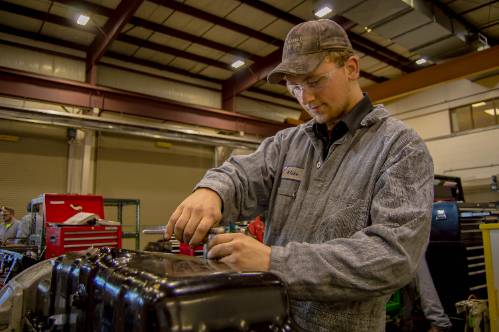 Diesel Technology
Diesel Technology
The Bachelor of Applied Science in Diesel Technology (BAS-DT) prepares graduates for careers in Diesel Technologies.
An applied bachelor’s degree in Diesel Technology (BAS-DT) provides the knowledge, skills and abilities needed to work on a variety of shops. The program provides advanced diesel skills and management courses.
Program Details
The BAS-DT program is an additional two years of full-time study beyond a two-year associate degree. Full-time students will complete six quarters of classes, 15-20 credits per quarter. The program does not offer summer classes.
Graduates of the BAS-DT program learn technical skills and develop their ability to communicate effectively and collaborate with peers. This helps them earn jobs as entry-level technicians and managers, and/or progress to other senior positions.
Centralia College is now accepting applications for the Bachelor of Applied Science (BAS) Fall 2026 cohorts! The deadline for priority consideration is February 27, 2026.
Here’s how to apply:
1. Apply to Centralia College- College: Centralia College
- Program: Baccalaureate
- Term: Fall 2026
- Degree or Certificate I am Seeking:
- Applied Management
- Behavioral Healthcare
- Diesel Technology
- Teacher Education
2. Complete the BAS Program Application
- Fill out the BAS Program application form online.
- After submitting your application, you will receive an email with instructions on submitting your non-Centralia College transcripts and any additional documents required for your application.
Both steps are required to be considered for admission.
If you have any questions or need assistance during the application process, please don’t hesitate to reach out to us at bachelors@centralia.edu or 360-623-8927.
We look forward to receiving your application and helping you take the next step toward your educational and career goals!
Minimum Admission Requirements
Admission into the BAS-DT program is merit-based. Meeting the minimum entrance requirements does not guarantee admission as the number of qualified applicants may exceed the number of enrollment spaces. In order to be placed into the admissions pool, applicants must complete or submit the following:
- Completion of the BAS application materials
- Proof of an earned associate’s degree in diesel technology, diesel mechanics, automotive OR 90 college-level credits (junior-level standing) from a regionally accredited college or university with a minimum cumulative GPA of 2.5
- 15 credits in diesel, automotive, or related field with at least a 2.0 GPA
- Or potential employment in the industry
General Education Degree Required Courses
The following courses must be completed prior to earning a bachelor's degree. The courses can be included in the two-year degree or be completed during the bachelor’s program in addition to the required courses.
- 10 credits of Communication
- 5 credits of Social Science
- 5 credits of college level MATH requiring MATH 099 as a prerequisite (such as MATH& 107, 141, 146)
- 5 credits of a Natural Science w/lab
- 10 credits of any distribution area (C, H, SS, M, NS)
Tuition
The State Board for Community and Technical Colleges (SBCTC) sets the tuition rate.
For the current year's tuition rate, see Tuition & Fees - Bachelor of Applied Science.
The cost of room and board would be additional.
Financial Aid
For information on applying for financial aid, see Financial Aid.
Scholarships
Students can apply for scholarships online from Dec. 1-March 1. Visit the scholarships page for information and a link to the online application.
Upon successful completion, students will have demonstrated the ability to:
Technical Outcomes
- Analysis and evaluation of data – Analyze and evaluate data collected from component failures, hydraulic systems, and complex electrical circuits.
- Professional interactions – Interact appropriately and professionally with customers and employees.
- Complex system operations – Explain the operation of complex systems including: computerized engine and transmission controls used for fuel efficiency and emissions control; regenerative hybrid technologies used to capture energy; multi-fuel technologies to save fuel costs.
- Theory application – Apply theories and skills taught in the classroom in a shop environment.
- Shop procedures – Create shop procedures that reflect industry standards and maintain compliance with regulations set by governing agencies.
- Fluids analysis – Apply the principles of tribology in the analysis of engine efficiency, life, and maintenance costs.
- Analysis of failure modes – Analyze test results from oil, coolant, fuel, or emissions analysis systems.
Managerial Outcomes
- Policies and Practices – Implement the practices, policies, and leadership to efficiently operate a fleet or repair facility.
- HR management and ethical principles – Apply fundamental principles of human resource management and ethics.
- Communications – Employ effective oral, written, and analytical communication appropriate to organizational settings including personnel situations and in large group discussions.
- Leadership styles – Distinguish between management and leadership, and differentiate among the varieties of styles and roles of management and be able to identify the most appropriate in a given situation.
- Use of teams – Create, manage, and participate effectively in teams
BAS-DT Education Plan
Degree: Bachelor of Applied Science
Emphasis: Diesel Technology
Credits: 96
| Junior Year | |
| Fall Quarter |
|
| Winter Quarter |
|
| Spring Quarter |
|
Notes - * Course has a prerequisite. **Must meet GURs (General University Requirements/ Distribution Requirements) as listed under the Associate in Arts Degree (DTA).
| Senior Year | |
| Fall Quarter |
|
| Winter Quarter |
|
| Spring Quarter |
|
Notes - * Course has a prerequisite. **Must meet GURs (General University Requirements/ Distribution Requirements) as listed under the Associate in Arts Degree (DTA).
